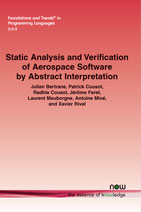Static Analysis and Verification of Aerospace Software by Abstract Interpretation
By Julien Bertrane, École Normale Supérieure, Paris, France, Julien.Bertrane@ens.fr | Patrick Cousot, École Normale Supérieure, Paris, France and New York University, USA, pcousot@cs.nyu.edu | Radhia Cousot, CNRS and École Normale Supérieure, Paris, France, Radhia.Cousot@ens.fr | Jérôme Feret, INRIA and École Normale Supérieure, Paris, France, Jerome.Feret@ens.fr | Laurent Mauborgne, AbsInt Angewandte Informatik, Germany, laurent.mauborgne@absint.com | Antoine Miné, Sorbonne University, University Pierre and Marie Curie, CNRS and LIP6, France, Antoine.Mine@lip6.fr | Xavier Rival, INRIA and École Normale Supérieure, Paris, France, Xavier.Rival@ens.fr
Abstract
We discuss the principles of static analysis by abstract interpretation and report on the automatic verification of the absence of runtime errors in large embedded aerospace software by static analysis based on abstract interpretation. The first industrial applications concerned synchronous control/command software in open loop. Recent advances consider imperfectly synchronous programs, parallel programs, and target code validation as well. Future research directions on abstract interpretation are also discussed in the context of aerospace software.
Static Analysis and Verification of Aerospace Software by Abstract Interpretation
It is well documented that fully automatic rigorous verification of complex software is very challenging and perfection is impossible. This monograph presents abstract interpretation and shows how its principles can be successfully applied to cope with the difficulties inherent to formal verification. It discusses the principles of static analysis by abstract interpretation, and reports on the automatic verification of the absence of runtime errors in large embedded aerospace software by static analysis based on abstract interpretation. The first industrial applications concerned synchronous control/command software in open loop. Recent advances consider imperfectly synchronous programs, parallel programs, and target code validation as well. Future research directions on abstract interpretation are also discussed in the context of aerospace software.
